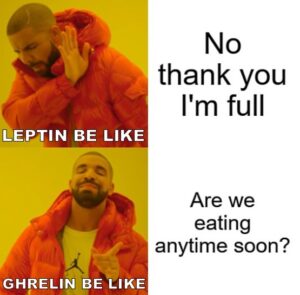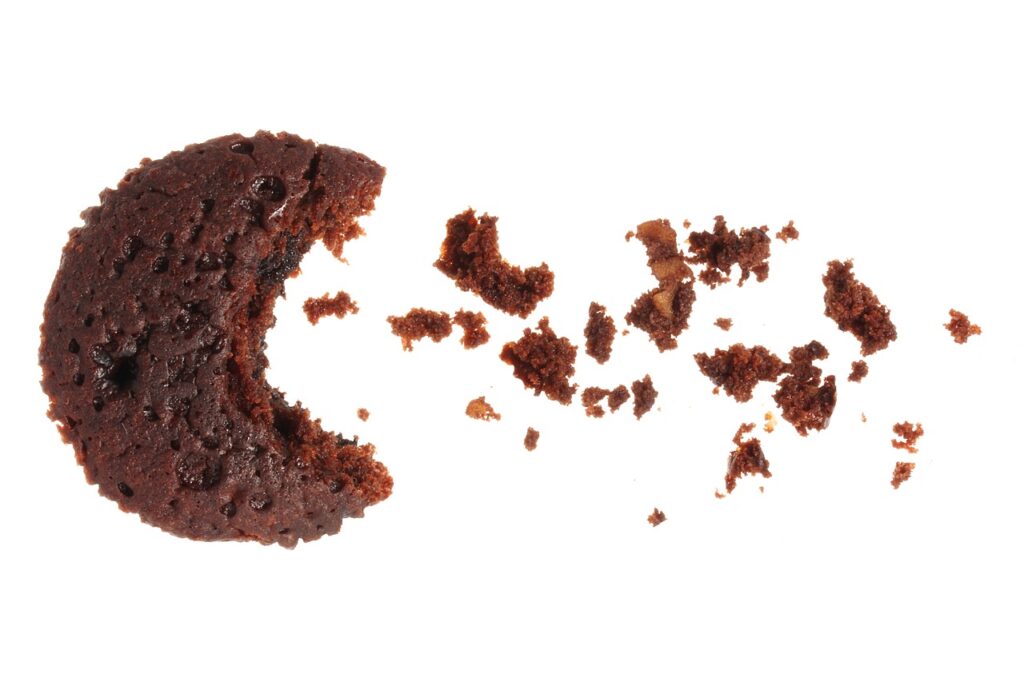It’s no surprise to know that hunger is the signal that your body uses to tell you that it’s time to refill the tank as you’re running out of energy but, are you really hungry or is it something else?
Your body is designed to stay in a situation of homeostasis or to simply say, a situation of equilibrium or balance, therefore when energy decreases it wants it to go up and when energy is in surplus, it won’t ask for extras.
Keep this in mind for now as it’s the key concept to understand hunger.
Two hormones keep you hungry or full
Let’s say you had breakfast at 7am and now it’s around 11:45am and lunch time is approaching.
What is going on inside of you that makes you feel the hunger signals even before knowing it’s lunch time? There are two hormones that are the main players when it comes to the physical desire to eat:
- Ghrelin
- Leptin
being respectively the hunger activator and suppressor. Let’s have a look at them a bit more in detail.
- Ghrelin is the hormone that increases hunger and it’s mainly secreted in the stomach lining.
- Leptin is the hormone that decreases hunger and it’s mainly secreted in fat cells.
they both work on our brain, specifically the hypothalamus, to send either hunger or satiety signals.

On a simplified view, if leptin comes from fat, the more body fat you have the less you should feel hungry and as a consequence, you should feel hungrier if you have less.
So theoretically speaking if you’re overweight, it could be easier for you to start a weight loss journey as your body should already feel less hungry.

There is a catch here, these two hormones and their related signals effectiveness can decrease in situation of obesity.
How long can you survive without food or water?
An article in Archiv Fur Kriminologie states that the body can survive for 8 to 21 days without food and water and up to two months if there’s access to an adequate water intake.
What happens if ghrelin's and leptin's activity is messed up?
If you have excessive body fat you might think that you have enough leptin and therefore shouldn’t be that hungry right?
Well…unfortunately you can develop a leptin resistance, your body is full of leptin but your brain doesn’t listen to its signal and your hunger stimulus doesn’t decrease increasing the risk of:
- Overeating.
- Increasing weight.
- Reduced leptin efficacy.
- More hunger, more food, more fat.
This is not to say that if you have extra kgs on your body you might be straight away leptin resistant but keep in mind that leptin resistance exists.
Ghrelin, on the other hand, is the one friend that gets hungry all of a sudden in your group, it’s the “I’m hungry, are we going to eat soon?” type of hormone that signals your brain it’s time to eat in the short term and it’s produced by your empty stomach, goes into your blood, reaches your hypothalamus and asks for food.
Both hormones in a normal situation take turns talking to your brain asking for opposite things, either to eat or to have you wait a little longer in this constant dance that the homeostasis is.

Now this is what happens normally: when you’re hungry, you eat and you stop being hungry for some time but… when you’re hungry, are you really hungry or is it something else?
To put that simply, when your stomach growls, is it because you physiologically need food or is it more of a random crave coming from the emotional side of hunger?
Why and how does your stomach growl when you’re hungry?
This growling has been of interest for so many years that the ancient Greeks came up with the rather interesting name for it: borborygmi (the plural of borborygmus).
The etymology of the term relies on onomatopoeia, an attempt to put the rumbling sound into words.
Borborygmi actually translates as “rumbling.”
When food enters your stomach it then moves into your intestine through a series of noisy, wave-like muscle contraction called peristalsis that push your meal all the way down.
Empty intestine and stomach still have contractions that make noise but there is nothing there to muffle it so you growl or you have a borborygmi.
How do you distinguish physical hunger from mental or emotional hunger?
There are a few ways to understand where is the hunger coming from that can also greatly help you to figure out what to do in case of borborygmi.
Physical hunger usually:
- Builds up during the day.
- Makes you hungry for food in general, not for something extra specific.
- Gives you a sense of satisfaction and fullness after eating.
- Is driven by necessity and it has intentional eating (not binging or just gulping down food).
- Is ultimately patient and allows you to reach the meal without driving you out of your mind.
Mental or emotional hunger generally:
- Appears suddenly and abruptly.
- Makes you crave a very specific type of food.
- Doesn’t make you feel full or satisfied but it keeps you craving more and more.
- Might give you a sense of guilt after eating and make you regret or feel “fat or unhealthy”.
- Is impulsive, whatever you have there in front of you might end up in your belly.
Let’s make an experiment then.
You’re sitting at your desk covered in work and all of a sudden your stomach growls like Godzilla has awaken.

The Broccoli test
Is it real hunger or a crave?
Let me introduce you the easiest test I know to find that out.
When you’re suddenly hungry and crave some treat that might not be ideal for your current nutrition, before jumping in the kitchen and feast on your snacks, breathe and ask yourself this question:
“If I had a bowl of broccoli here now, would I eat them instead?”
Is your reply something along the lines of “nope, I’d rather have a slice of cake instead” chances are you are not really hungry but just craving.
When your answer is more in line with “yeah, I’d have that if I could” then you are probably physically hungry so it might be time to snack on something.
Take a deep breath
Emotional hunger triggers are everywhere and they mostly revolve boredom and stress, knowing this might help you understand what to do next time when the growl is growling:
- Did an email make you angry?
- Are you bored and got nothing do to?
Far from saying that I’m against snacking, I just want to stress the fact that everything can find place in your diet in moderation while giving priorities to nutrient dense foods vs calorie packed snacks.
The first ones are here to help you in the long term building the body that matches your goal.
The second ones are here to occasionally help you keep your sanity and enjoy the body transformation process but they shouldn’t be the base of it.
How to start dealing with snacking?
I’m going to be honest with you, I love chocolate and cookies, I work from home and understand that they can be part of my diet, just not in the quantity my brain craves so here is what I do for myself and what I recommend you to work on as well.
When I’m suddenly craving some snack, usually in the afternoon, I ask myself the same broccoli question. When the answer is negative and I want some chocolatey snack or cookie, I perform 5 actions:
- Drink a big glass of water.
- Wait 5 minutes, reply to a couple of work emails or messages.
- Ask myself a key follow-up question that is “am I still hungry and do I really need that snack?”
If the answer is no then I simply keep working until work is done, go to the gym have dinner later.
If the answer is yes then.. - Get into my apples bowl (I always have apples in the kitchen and I recommend you to have some too!) grab one, slash it and eat the apple first.
When I’m done with it I ask myself, am I still really hungry? Most of the time the answer is no and that’s it but if the answer is “absolutely so” then I move to the 5th step: - Grab that one snack I wanted, eat it, enjoy it and move on.
Bonus trick to help you staying on track
Here is a trick that I use on myself here at home to reduce impulsive or uncontrolled snacking the trick is simple: I put all of my snacks in a specific drawer in the kitchen that requires me to
- Actually want to go there
- Kneel down
- Open the drawer
- Dig to find what I want and then finally have it
So many steps that most of the time make me simply forget about them and go on with my day normally.
If you have snacks in plain sight it can be difficult to say no.
Try the same?
Store them somewhere where you have to actually go to choose one other than simply have them at arm’s length, and trust me this makes a huge difference!

